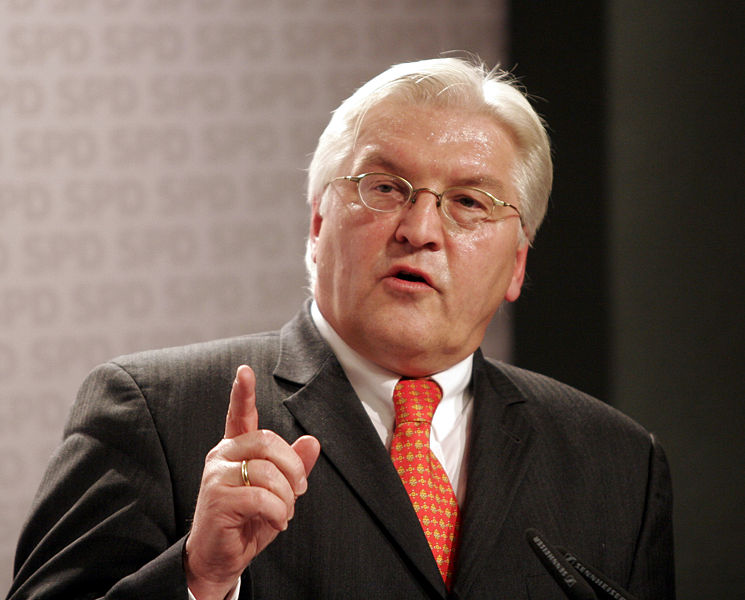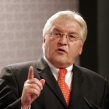
MOSCOW, SOKHUMI STOP GERMAN PLAN BEFORE THE START
Publication: Eurasia Daily Monitor Volume: 5 Issue: 137
By:

German Minister of Foreign Affairs Frank-Walter Steinmeier landed in Georgia on July 17 to promote a German plan for resolution of the Abkhazia conflict. The plan’s general outline had emerged through semi-official reports in the German press during the preceding fortnight. The German MFA’s special envoy for the region, Hans-Dieter Lukas, presented the confidential document on July 13 and 14 to the Georgian government and to the Abkhaz de facto authorities, respectively; and flew immediately to Moscow for further consultations.
The plan envisages a political settlement of the conflict in three phases. The first, of one year’s duration, includes confidence-building measures to be taken jointly by Tbilisi and Sokhumi and a start to the return of Georgian expellees to their homes, initially to the Gali district. The second phase, also of one year’s duration, envisages economic reconstruction and a donors’ conference in Berlin to finance joint Georgian-Abkhaz projects in that regard. The third phase, of unspecified duration, would focus on determining Abkhazia’s political status–the most challenging issue of all, according to the plan’s German drafters (German government press release, July 9). Other provisions and all details remain confidential.
Germany took this initiative in its current capacity a coordinator of the UN Secretary General’s Group of Friends of Georgia, a dormant body of long-proven irrelevance, where Russia paralyzes the group’s Western members: the United States, Britain, France, and Germany. Created well over a decade ago by these Western countries as Friends of Georgia, the group lost that meaning later by accepting Russia as a veto-wielding member and redefining the group as friends of successive UN chiefs, rather than of Georgia as such. The Group’s self-imposed rule of operating by internal consensus with Russia has robbed it of any effectiveness.
Nevertheless, the German plan is far from Russia’s liking. As Steinmeier summed up the motivation of Germany’s initiative, “We intend to take an active part in putting out the last remaining hot spots of tension in Eastern Europe” (Georgian Public TV, July 17). This seems to reflect a significant, positive reassessment in Berlin; it defines Georgia as a part of Eastern Europe and asserts a shared German responsibility for resolving the situation outside a Russian-controlled context, albeit still using a formal umbrella that includes Russia. Consequently, Moscow set a trap for Berlin by allowing Steinmeier to go public with the plan and only then shooting the plan down.
A meeting of the Group of Friends in Berlin in late June had cleared the German-drafted plan and authorized its presentation by Steinmeier in Tbilisi and Sokhumi on the group’s behalf. Russia went along with the view that some steps were necessary to defuse tension and it agreed with this particular initiative “in principle.” Possibly overlooking the risks hidden in this Russian phrase, some German diplomats in media interviews “emphasized that the Russian government basically agreed” (Financial Times Deutschland, July 17).
Steinmeier was careful to coordinate his steps with Moscow and Sokhumi before embarking on the visit to Georgia. When envoy Lukas presented the plan to the Abkhaz authorities, however, Moscow and Sokhumi rejected it by setting identically worded preconditions, unacceptable to Georgia and even to countries supportive of Georgia. The preconditions include: withdrawal of Georgian “armed formations” (a term that would include police) from the upper Kodori Valley; retention of the existing (i.e., Russian-controlled) negotiating format; and indefinite postponement of the start of the return of Georgian expellees (Itar-Tass, Interfax, Apsnypress, July 13-17).
Abkhaz “president” Sergei Bagapsh and other leaders told Lukas in Sokhumi that they would only discuss the recognition of Abkhazia’s separation from Georgia. This was their reply on July 15 when the document was handed over, before studying it. Only hours later, having studied the document, they told the European Union’s visiting envoy Peter Semneby that Sokhumi would “not consider the plan in its present form.” The Abkhaz leaders would consider the refugees’ return, limited to Gali only, provided that Georgia abides by the “agreements signed earlier,” meaning first and foremost the 1994 Moscow agreement, which cemented Russian control on the ground. As an aside, the Abkhaz reproached Georgia for being “overenthusiastic about its relations with the United States” (Itar-Tass, Apsnypress, July 15, 16).
Regarding the Georgian expellees, Russian Minister of Foreign Affairs Sergei Lavrov termed their return to Abkhazia “absolutely unrealistic” for the foreseeable future (Interfax, July 17). Georgian President Mikheil Saakashvili responded that such an attitude was “absolutely shameless” and reflected an “inhuman and barbaric” approach to a basic humanitarian issue (Georgian Public TV, July 17).
Lavrov timed his conclusive nyet to coincide precisely with Steinmeier’s landing in Georgia, evidently attempting to rob the visit of real meaning. U.S. Secretary of State Condoleezza Rice and Assistant Secretary Daniel Fried had on the previous day (July 16) initiated telephone calls to Lavrov and his deputy, Grigory Karasin, attempting to enlist their cooperation with the German, and “Friends’,” plan (RIA-Novosti, Itar-Tass, July 16). Moscow reported the U.S. intercessions, only to ignore them demonstratively.




